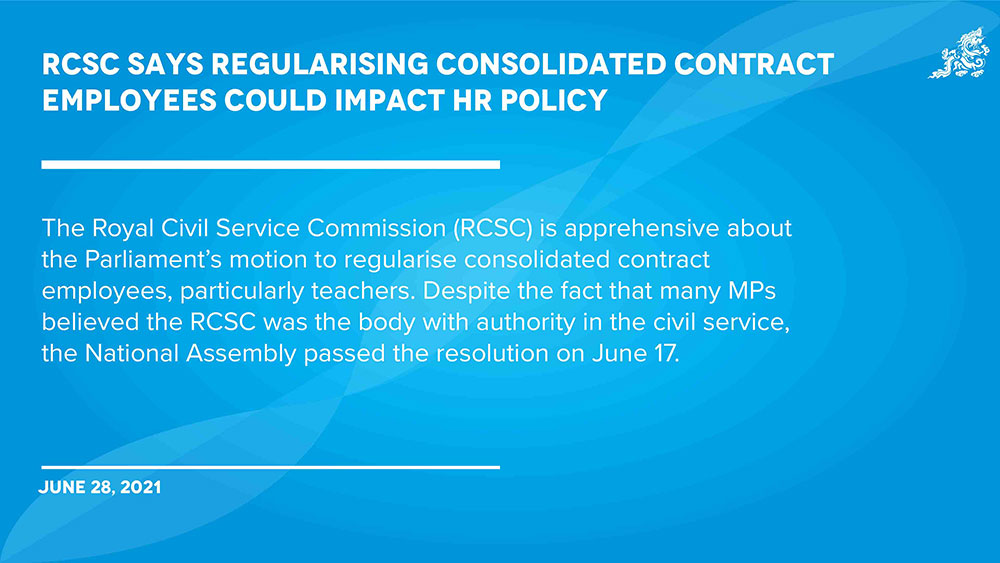Yangchen C Rinzin
The National Assembly on June 17 passed a motion to regularise consolidated contract employees, in other words, regularising the employment of those on contract, especially teachers.
The Royal Civil Service Commission (RCSC), as an independent and constitutional body, is unsure how to respond to Parliament’s recommendation. It is a tricky issue for the Commission
The Commission, if they implement the resolutions, says it could impact the RCSC’s policy because there are requirements to recruit people on contract.
The National Speaker, Wangchuk Namgyel, said that the resolution made was based on the motion moved by a member of parliament (MP) and it was a recommendation to the government to explore the possibility of regularising consolidated contract employees with the RCSC.
“It will entirely depend on RCSC whether it’s implementable or not and it’s not necessary they must implement,” the Speaker said. “The Parliament’s resolution will be given to the government and not directly to the Commission.”
The Speaker said that it is only a resolution passed and the government will have to follow up and discuss with the RCSC. “The resolution will be reported in the next session for follow up.
If it’s not easy to implement, the government will have to explain why.”
Maenbi-Tshaenkhar MP Choki Gyeltshen, moved the motion to review the consolidated contract employees and make them regular contract employees, reasoning that consolidated contract employees did not enjoy increments, benefits, and lack of financial security, among others.
Despite many MPs opining that the RCSC was the body with authority in the civils service, the House passed the resolution.
As per the Commission’s record, there are, today, 4,378 civil servants on contract. Of which, 3,639 are on consolidated contract and the rest 739, are on regular contract who are in the teaching field.
Of the total consolidated 3,639 employees, 933 are teachers, majority of them are Dzongkha subject teachers. Almost 1,800 consolidated contract employees are in schools.
Consolidated and Regular contract
The Commission is mandated to recruit 10 percent of teachers on contract. An official from the Commission said that this was because every year, some schools do not have the required number of students, reducing the requirement of teachers.
“Keeping this in mind, we project the recruitment of teachers,” the official said. “This is when some are recruited on consolidated or regular contracts.”
Regular contract means when the employees are recruited against the approved staff strength to address the shortage of human resources for a particular category of position/job in the agency.
For instance, the official said that trained teachers who secured 50 percent and above during the Bhutan Civil Service Examination (BCSE) are hired on regular contract in the P5(b) position.
Consolidated contract employees are recruited when there is a critical need for the specific qualification, skills, and experience for that category of position/job. It is also done to substitute staff who are on extraordinary leave, study leave, and maternity.
However, the official said that contract terms for both the contracts are the same, which is two years and renewed based on the performance of the employee or until the vacancy is filled. “But in a consolidated contract, the employee employed on substitution should leave once the particular employee returns.”
The official said that the only difference in the regular and consolidated contract is that while regular contract employees would be eligible for 30 percent contract allowance and increment, consolidated employees are not eligible.
“Otherwise, both get the same salary including housing allowance. The reason for giving 30 percent contract allowance is because regular contract employees are recruited through normal recruitment process through BCSE and those under consolidated contract are not.”
The official added that consolidated contract employees are more in teaching because when the education ministry came up with the policy to recruit Dzongkha teachers for every class the demand increased. This is why some consolidated employees are serving more than two years.
“ Dzongkha teachers are recruited on consolidated contract to fill the gaps. Consolidated contract would be done away once there are enough Dzongkha teachers in the market, which might take about five years.
Impact of the resolution
The Commission is apprehensive about the resolution. Officials said that the resolution would impact the merit system in the RCSC apart from burdening the government with budget.
A RCSC official said that the foundational system of RCSC, which is based on merit system to protect civil servants, would be disturbed.
“If the background of the contract employees is well understood, such a decision would not have been discussed in the Parliament,” the official said. “Parliament resolution would mean that RCSC should regularise consolidated contract employees automatically without having to fulfil recruitment processes.”
She added that regularising would be unfair to regular contract employees and regular civil servants who were recruited through recruitment process by competing in the BCSE.
“If consolidated employee wants to go to other categories, they have to go through a merit examination and pass the exam. We cannot change the policy simply because it was decided in the Parliament.”
Implementing the Parliament’s decision would also mean that trained or untrained or skilled or unskilled civil servants would be paid equally without the merit system.
“If we regularlise consolidated contract employee to regular contract, we would have to give them the 30 percent contract allowance and increment, the sole reason that differentiates the merit ranking at present,”an official said. “Consolidated contract employees are usually recruited through interviews by respective agencies and are not trained teachers in the case of teaching.”
It would also cost the government’s recurrent budget.
Earlier Foreign Minister Dr Tandi Dorji shared in the Parliament that there are 933 consolidated contract employees with each teacher on consolidated contract earning Nu 371,460 yearly and with regularisation they would earn Nu 458,737 which is an increase of Nu 87,277.
This means that if 3,639 employees are regularised, about Nu 150 million would be spent on their salary.


